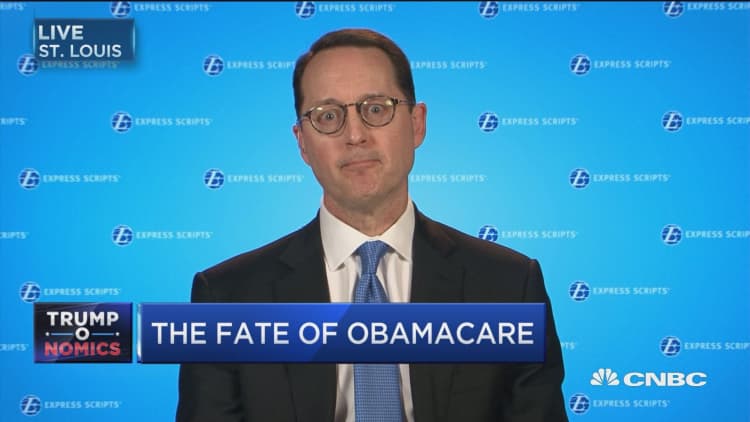
While President Donald Trump and Republicans on Capitol Hill move to get rid of Obamacare, Express Scripts CEO Tim Wentworth told CNBC on Monday he believes a replacement can be crafted to save money for the nation and for Americans.
"Our health plan clients are very engaged in the Obamacare program. What we've seen is obviously they struggle to keep their costs as low as possible; both their premiums and their out-of-pocket costs," Wentworth said on
As the leader of the largest U.S. pharmacy benefits manager, which negotiates drug prices on behalf of insurers and employers, Wentworth said he's encouraged that it appears the Obamacare successor would provide wide access to health insurance.
"There's a lot that can be done that can help score a replacement plan in a way our nation can afford it and our patients can benefit from it," Wentworth said.
In Sunday's pre-Super Bowl interview on Fox News, Trump said the "very complicated" process to repeal and replace Obamacare may take "until sometime into next year."
Trump and GOP congressional leaders have said getting rid of former President Barack Obama's health-care plan is a top priority.
The president also wants to attack health care costs by lowering drug prices. In a meeting last week with pharma CEOs, Trump praised the industry for breakthrough treatments but said drug prices need to come down.

In a report released Monday, Express Scripts said drug prices rose by about 11 percent last year, but the costs for employers increased just 2.5 percent across all prescription drugs.
Wentworth told CNBC the best way to make drugs less expensive would be to allow more generics on the market, which would drive competition and force the makers of name-brand treatments to lower their prices.
The recent outrage over drug prices started in 2015, when former Turing Pharmaceuticals chief Martin Shkreli jacked up the cost of malaria and HIV medicine Darapim overnight from $13.50 to $750.
Then last summer, Mylan drew public ire when it was revealed that the company hiked the cost of EpiPen allergy injectors by more than 400 percent over several years.


